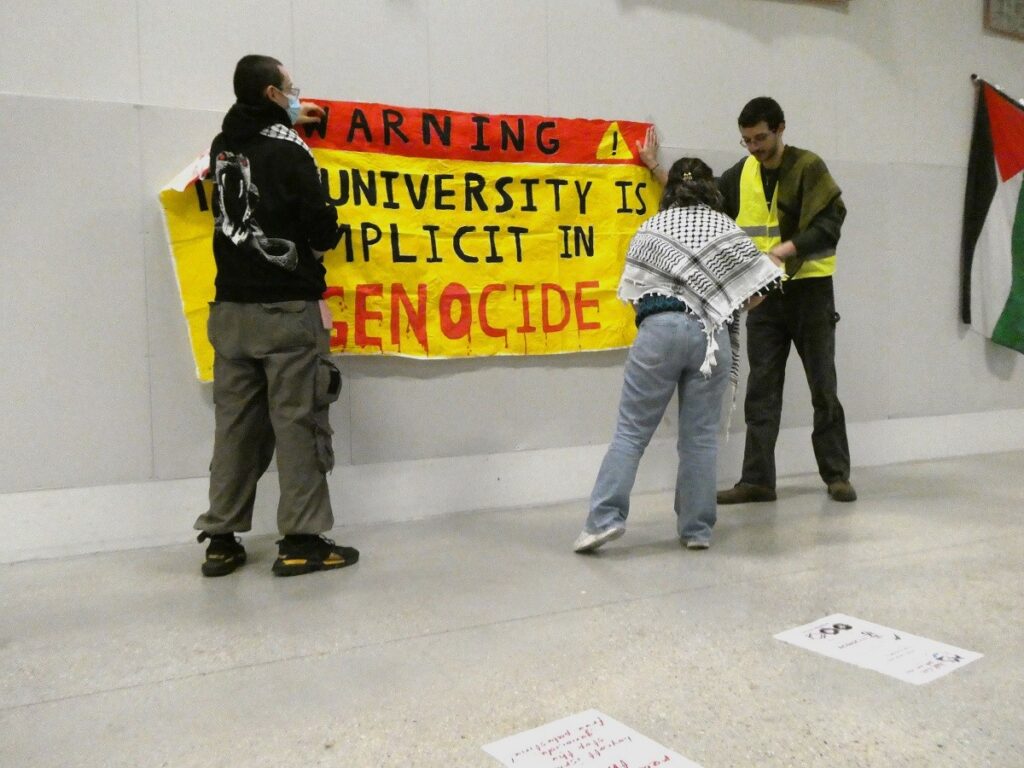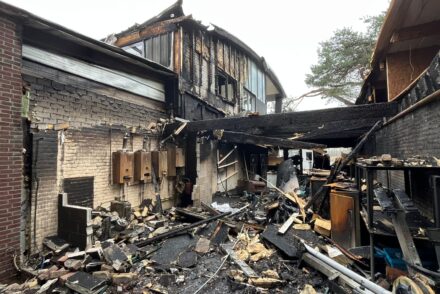“Wim has blood on his hands”: when does protest language cross the line?
“Wim van de Donk supports genocide.” The slogans of Palestine Solidarity Tilburg are sharp and personal. Students and staff often feel they go too far. Are such expressions part of freedom of speech or not?

Anyone walking across Professor de Moorplein toward campus passes several posters from Palestine Solidarity Tilburg (PST). The message is clear: Tilburg University is complicit in the genocide in Gaza. Not exactly a soft claim.
PST regularly uses strong slogans, shouted during protest marches or displayed on banners at the library bridge. “Wim supports genocide” or “Wim has blood on his hands” referring to the rector magnificus of Tilburg University. During the university council meeting in June, demonstrators even unfurled a banner calling Van de Donk a “war criminal.”
A step too far
Many students and staff believe the slogans go too far. Holding the rector and the university personally responsible for the suffering in Gaza is, in their view, crossing a line. ‘Defamatory,’ one staff member told Univers. Another called it ‘overstepping a boundary.’
So, do such expressions indeed go too far? ‘Freedom of expression is an absolute precondition for a well-functioning democracy,’ says Alice Dejean de la Bâtie, professor of law at Tilburg Law School. But that doesn’t mean everything goes.
Protest versus safety
Within the university, freedom of expression can clash with the responsibility to ensure that education takes place in a safe and undisturbed manner. ‘If a protest or expression threatens other students or seriously disrupts teaching, the university can intervene,’ Dejean de la Bâtie explains.
But the restrictions are clearly defined, she says. Political preferences or the content of a debate can never, in themselves, be grounds to suppress opinions.
Posters: protest or defamation?
Sometimes the assessment is straightforward. When PST occupied the Dante building, there was a direct disruption of education at the university. In that case, the university is allowed to intervene.
But slogans and chants do not disrupt education, even if they are sharp and personal. Legally an expression can fall under defamation, but that doesn’t automatically mean it is forbidden.
‘In the same way that blocking a road can be an offense justified by freedom of expression, the same applies to defamation,’ says Dejean de la Bâtie.
‘It may be defamatory, but that doesn’t necessarily make it illegal,’ she continues. ‘Certainly not when it concerns a matter of public interest, such as Gaza, and especially not if it can be factually substantiated.’
Harsher response to certain protests
According to Dejean de la Bâtie, the debate goes beyond the university context. She observes a broader trend across Europe: pro-Palestinian and climate protests are being dealt with more strictly than, for example, farmers’ protests.
‘Protest is meant to be disruptive,’ she emphasizes. ‘If you make demonstrations harmless by imposing too many rules, they lose their power. And with that, a democratic right is being eroded.’







